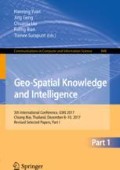Abstract
Traffic flow prediction has become a hot spot in the intelligent transportation system study and is attracting more and more researchers. Short-term traffic flow prediction is an important issue of Traffic flow prediction. In this paper, ARIMA (Auto-Regressive Integrated Moving Average) model is used to predict short-term traffic flow of subway. We focus on selecting the most appropriate parameters - p and q of ARIMA model through Stationarity Test, Model Recognition, Parameter Estimation, Model Diagnosis and Prediction except a single AIC (Akaike Information Criterion) estimation or single SACF (Sample Auto-Correlation Function) plots. And then, we predict passenger flow of five subway stations of Guangzhou Metro using presented method and SVM (Support Vector Machine). The experiments’ results show that ARIMA model performs better than SVM, AIC or SACF&SPACF (Sample partial Auto-Correlation Function) in short-term traffic flow prediction.
Access this chapter
Tax calculation will be finalised at checkout
Purchases are for personal use only
References
Official Statistics of GuangZhou Passenger. http://www.gzmtr.com/ygwm/xwzx/gsxw/
Yan, M.: Study and application of time series similarity and forecasting algorithm. Doctoral thesis. Beijing Jiaotong University (2014)
Pati, J., Kumar, B., Manjhi, D., Shukla, K.K.: A comparison among ARIMA, BP-NN and MOGA-NN for software clone evolution prediction. IEEE Access 5, 11841–11851 (2017)
Shu, K., Jing, L., Mei, L., Xin, Z.: Prediction based on support vector machine for travel choice of high-speed railway passenger in China. In: International Conference on Management Science and Engineering, pp. 28–33 (2011)
Cao, C.: High-speed rail passenger flow forecasting based on EMD-BPN method. Lanzhou Jiaotong University (2015)
Dhib, E., Zangar, N., Tabbane, N., Boussetta, K.: Impact of seasonal ARIMA workload prediction model on QoE for massively multiplayers online gaming. In: 2016 5th International Conference on Multimedia Computing and Systems (ICMCS), pp. 737–741 (2016). http://dx.doi.org/10.1109/ICMCS.2016.7905664
Calheiros, R.N., Masoumi, E., Ranjan, R., Buyya, R.: Workload prediction using ARIMA model and its impact on cloud applications’ QoS. Cloud Comput. IEEE Trans. 3(4), 449–458 (2014)
Ni, M., He, Q., Gao, J.: Forecasting the subway passenger flow under event occurrences with social media. In: Proceedings of IEEE Transactions on Intelligent Transportation Systems, pp. 1–10 (2017)
Si, B., Fu, L., Liu, J., Shiravi, S.: A multi-class traffic assignment model for predicting transit passenger flows - a case study of beijing subway network. In: Transportation Research Board 93rd Annual Meeting (2014)
Zhou, J.B., Chen, H., Yan, B., Zhang, W., Feng, W.: Identification of pedestrian crowding degree in metro transfer hub based on normal cloud model. J. Jilin Univ. Eng. Technol. Ed. 46(1), 100–107 (2016)
Xu, W., Qin, Y., Huang, H.: A new method of railway passenger ow forecasting based on spatio-temporal datamining. In: The International IEEE Conference on Intelligent Transportation Systems, Proceedings, pp. 402–405 (2004)
Tsai, T., Lee, C.K., Wei, C.H.: Neural network based temporal feature models for short-term railway passenger demand forecasting. Expert Syst. Appl. 36(2), 3728–3736 (2009)
Gavirangaswamy, V.B., Gupta, G., Gupta, A., Agrawal, R.: Assessment of ARIMA-based prediction techniques for road-traffic volume. In: Fifth International Conference on Management of Emergent Digital EcoSystems, pp. 246–251 (2013)
Williams, B.: Multivariate vehicular traffic flow prediction: evaluation of ARIMAX modeling. Transp. Res. Rec. J. Transp. Res. Board 1, 194–200 (2001)
Pemberton, J.: Time Series Analysis with Applications in R, 2nd edn. Springer, New York (1999). https://doi.org/10.1007/978-0-387-75959-3
Box, G.E.P.: Time Series Analysis: Forecasting and Control, 4th edn. Wiley, Canada (2008)
Acknowledgments
This paper is supported by “National 863 project (No. 2015AA050204)” and “State Grid Corporation project (No. 520626170011)”. We would like to thank Guangzhou Metro Operation Department.
Author information
Authors and Affiliations
Corresponding author
Editor information
Editors and Affiliations
Rights and permissions
Copyright information
© 2018 Springer Nature Singapore Pte Ltd.
About this paper
Cite this paper
Yan, D., Zhou, J., Zhao, Y., Wu, B. (2018). Short-Term Subway Passenger Flow Prediction Based on ARIMA. In: Yuan, H., Geng, J., Liu, C., Bian, F., Surapunt, T. (eds) Geo-Spatial Knowledge and Intelligence. GSKI 2017. Communications in Computer and Information Science, vol 848. Springer, Singapore. https://doi.org/10.1007/978-981-13-0893-2_49
Download citation
DOI: https://doi.org/10.1007/978-981-13-0893-2_49
Published:
Publisher Name: Springer, Singapore
Print ISBN: 978-981-13-0892-5
Online ISBN: 978-981-13-0893-2
eBook Packages: Computer ScienceComputer Science (R0)

